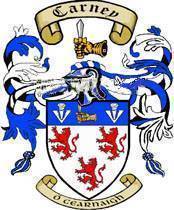
Carney & Wehofer Family
Genealogy Pages

Henry, III "The Explorer" HUDSON[1]
-
Name Henry, III "The Explorer" HUDSON Nickname The Explorer Birth 1570 Tamworth, Staffordshire, England  [2]
[2] Gender Male unknown The Explorer  [2]
[2] Title (Facts Pg) Name The Explorer _UID D34CC8558E0B426D8556612F3D617FF3FF2A Death Aft Jun 1611 At Sea After Mutiny With Son John (No Known Issue Of John)  [2]
[2] Person ID I16241 Carney Wehofer 2024 Genealogy Last Modified 5 Feb 2012
Father Henry II HUDSON, b. 1541, Tamworth, Staffordshire, England  d. Bef 1632, Tamworth, Staffordshire, England
d. Bef 1632, Tamworth, Staffordshire, England  (Age 90 years)
(Age 90 years) Marriage - REFN6742
Family ID F8083 Group Sheet | Family Chart
-
Notes - REFN: 892
[Captain John Bunch.ged]
Date of Birth Source: Jennifer Hudson Taylor at
www.familytreemaker.com/users/t/a/y/Jennifer-H-Taylor/.
Hudson, Henry (1570-1611), English navigator, famous for four great
voyages of discovery; a river and a bay in North America are named for
him. Nothing is known of Hudson's life before 1607, the year in which he
undertook his first expedition for the English Muscovy Company.
Commanding a single ship, the Hopewell, Hudson touched the shores of
Greenland and the Svalbard islands, and sailed as far northas 80°23' in
an attempt to find a northeast passage by way of the Arctic Ocean to the
Far East. During the following year he sailed in the same ship under the
auspices of the same company, and again attempted unsuccessfully to find
a passage, this time by way of the islands of Novaya Zemlya in the
Barents Sea. Upon his return, the Muscovy Co. withdrew their support, and
Hudson turned to the Dutch East India Co. for new funds and a ship to
carry on his work. In that company's employ he sailed from the Dutch
island of Texel, on his third voyage in 1609, in the Half Moon, a vessel
of about 73 metric tons, with a mixedDutch and English crew of 18 or 20
men. He again began his exploration off Novaya Zemlya, intending to try a
passage through the ice, but his crew, having endured extremely cold and
harsh weather, mutinied, and Hudson headed west andsouth past Nova
Scotia and down the North American coast, in the belief that the Atlantic
Ocean was separated from the Pacific Ocean only by a narrow isthmus. In
September 1609 he first entered New York Bay, and he spent the following
month exploring the Hudson River to a point about 240 km (about 150 mi)
from its mouth, at about the present site of the city of Albany. Before
the end of the year Hudson and his men returned to England, where they
and their ship were seized by the government. Hudson was commanded from
that time on to serve only the country of his birth.
In 1610 Hudson set out on his final voyage under the patronage of a
newly formed company of English gentlemen. In his new ship, the
Discovery, he decided from the start to search for a northwest passage;
he reached the Hudson Strait by the middle of the year, and passed into
Hudson Bay beyond it, where he spent three months exploring the eastern
islands and shores. By November his ship was frozen in, and a winter of
extreme privation and cold led to dissension among the crew. A part of
the crew mutinied in June 1611 and put Hudson, his son, and seven others
of the company adrift in a small boat. A few survivors from the mutinous
crew reached England, where they were imprisoned, but Hudson and the
others were never seen again.
SOURCE: "Hudson, Henry," Microsoft® Encarta® Encyclopedia 2000. ©
1993-1999 Microsoft Corporation. All rights reserved.
Henry III - d. 1611, abandonded at sea after amutiny with his son JOHN.
There have been no other issue (children) found, so, no descendants are
known. Extensive information is available on a web site. An explorer for
the Muscovy Company, Henry HUDSON failed to open a northeast passage to
China on expeditions in 1607 and 1608. A log written by John PLEYCE,a
cremember on the 1607 voyage, includes the following entry: "Anno 1607,
April the nineteenth, at Saint Ethelburge, in Bishops Gate street, did
communicate with the rest of the Parishoners these persons, seamen,
purposing to goe tosea four days after, for to discover a passage by the
North Pole to Japan andChina. First, Henry Hudson, master. Secondly,
William Colines, his mate. Thirdly, James Young. Fourthly, John Colman.
Fiftly, John Cooke. Sixtly, James Beubery. Seventhly, James Skrutton.
Eightly, John Pleyce. Ninthly, Thomas Baxter.Tenthly, Richard Day.
Eleventhly, James Knight. Twelfthly, John Hudson, a boy."
Losing support of the Muscovy Company, Henry the 3rd sailed in the Half
Moon for the Dutch East India Company in 1609, disco
- REFN: 892
-
Sources
